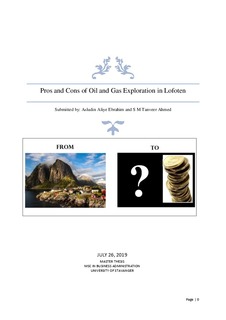Pros and Cons of Oil and Gas Exploration in Lofoten.
Abstract
The aim of the study is to logically respond to the ongoing dilemma on Lofoten that whether Lofoten should be open for oil and gas extraction based on cost-benefit analysis. So far, our knowledge is concerning a little attempt that has been made to evaluate the Lofoten area by considering all possible costs and benefits by conducting an optimal cost benefit analysis.
Net Present Value (NPV) method is used to analyse the net effects after collecting and processing the secondary data. It is a 50 years projection from 2020 to 2070 and therefore previous data are extensively used to project future cash flows, which were discounted by 3% rate which is also the rate of return from the Norwegian Government Pension Fund Global (GPFG). The direct benefit from oil and gas extraction, possible indirect losses from fishing and tourism, expected petroleum supply sector benefit, possible oil spill and clean-up costs and environmental cost are the basic factor that has been taken into consideration during the course of the study. Net costs are deducted from the net benefit we come up with a negative value (net loss) of NOK 1.71 billion. That indicates that considering the aforementioned factors if oil and gas extraction is allowed in Lofoten area the ,Norwegian government will incur a loss of NOK 1.71 billion over the next 50-year period. Therefore, the answer of the question of “whether Lofoten should be open for oil and gas extraction” is “No” according to our finding. In addition, we also suggested the avenue for future researches by presenting the fact that our study hasn’t taken into account.
Description
Master's thesis in Business Innovation

